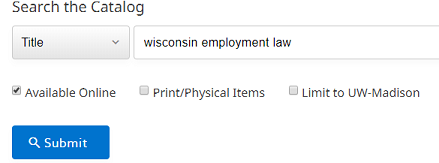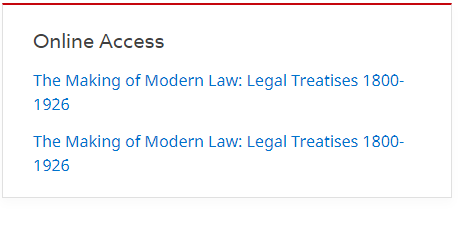The Law Library Catalog
Did you know that you can locate online books by title, author or subject—just like their print companions—in the law library catalog? More library books are becoming available online and the Law Library's collection is reflecting this trend. However, sometimes books online can be more difficult to locate. The main reason for this is that these books are often part of a larger database collection. Books embedded in a database cannot always be recorded in the library catalog, making these books harder to find.
To help locate these hidden resources, here are a few tips for finding eBooks at the Law Library.
Searching the Catalog
At the catalog's home page, https://search.library.wisc.edu/, enter the title, author or subject by choosing from a list in the drop down menu bar, in "basic search," then, to narrow your search to online material, select the button below the menu box marked, "available online," and submit.

Searching by Topic
To locate books about the topic "negligence" type "negligence" in the menu box, select subject from the drop down menu, then mark the button, "available online," to pull up online books on negligence.
Searching by Title
To locate a book by title, enter the title, for example: Counter negligence : a treatise on the law of contributory negligence or negligence as a defense, select the "avialable online" button below the menu box, and tap enter on your keyboard. The online version of the record will appear. On the right-hand side of the screen you''ll see a link to the Making of Modern Law:Legal treatises 1800-1926, a collection of legal treatises that is located in the HeinOnline database.  Please note that most books in HeinOnline have a link from the catalog, this is also true for Books Unbound, but books in Westlaw, Lexis or Bloomberg Law often are not recorded in the library catalog.
Please note that most books in HeinOnline have a link from the catalog, this is also true for Books Unbound, but books in Westlaw, Lexis or Bloomberg Law often are not recorded in the library catalog.
Here are tips on how to find databases that have books on your topic:
But first, a research tip: When you are looking for legal resources, consider two questions. 1. What is the jurisdiction? 2. What is the topic? Answering these two questions will help guide you to a database that specializes in the resources best suited to your research. You can also search by subject or keyword in the Law Library's ALL LAW DATABASE site, https://library.law.wisc.edu/all-law-databases/. Look for the search box on the top far right side of the screen directly under the print/excel/CVS/copy icons.
Locating eBooks in Legal Databases
Wisconsin Law
For books authored by Wisconsin attorneys and published by the Wisconsin Bar Association, search Books Unbound, http://digital.library.wisc.edu/1711.web/books-unbound
Business Law & More
For treatise on legal topics, with an emphasis on business law, search Bloomberg Law, https://www.bloomberglaw.com/
Historical Legal Resources
For historical material, check HeinOnline, https://heinonline-org.ezproxy.library.wisc.edu/HOL/Welcome
For example, Legal Classics, has these two historical items:
NAACP's Legal Strategy against Segregated Education, 1925-1950
International Law
For international commerical arbitration material, check out KluwerArbitration, http://www.kluwerarbitration.com/
The database has a tab dedicated to books on arbitration.
Lexis & Westlaw
Don't forget that both Lexis Advance and Westlaw Edge have books available on their datbases on so many legal topics that I cannot list them in this brief article. These databases also have legal form books as well as the standard legal treatises. To locate books on Lexis, select "secondary material" and use the "category" filter on the left-hand side of the screen to select treatises or practice material. In Westlaw select "secondary sources" and select "Text and Treatises."
LexisAdvance, http://lawschool.lexis.com
WestlawEdge, http://lawschool.westlaw.com
Submitted by Jenny Zook, Reference Librarian on September 19, 2019
This article appears in the categories: Law Library